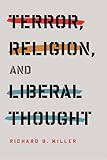Terror, religion, and liberal thought / Richard B. Miller.
Material type: TextSeries: Columbia series on religion and politicsPublication details: New York : Columbia University Press, ©2010.Description: 1 online resource (x, 227 pages)Content type:
TextSeries: Columbia series on religion and politicsPublication details: New York : Columbia University Press, ©2010.Description: 1 online resource (x, 227 pages)Content type: - 9780231521864
- 0231521863
- 1282784528
- 9781282784529
- 9786612784521
- 6612784520
- Violence -- Religious aspects
- Terrorism -- Religious aspects
- Political violence
- Liberalism
- Human rights
- War -- Religious aspects
- Toleration -- Religious aspects
- Free enterprise
- Violence -- Aspect religieux
- Terrorisme -- Aspect religieux
- Violence politique
- Libéralisme
- Droits de l'homme (Droit international)
- Guerre -- Aspect religieux
- terrorism
- liberalism
- RELIGION -- Sexuality & Gender Studies
- RELIGION -- General
- Free enterprise
- Human rights
- Liberalism
- Political violence
- Terrorism -- Religious aspects
- Toleration -- Religious aspects
- Violence -- Religious aspects
- War -- Religious aspects
- 201/.763325 22
- BL65.V55 M56 2010eb
- online - EBSCO
| Item type | Current library | Call number | URL | Status | Notes | Barcode | |
|---|---|---|---|---|---|---|---|
 eBook
eBook
|
Biblioteca "Angelicum" Pont. Univ. S.Tommaso d'Aquino Nuvola online | online - EBSCO (Browse shelf(Opens below)) | Online access | Not for loan (Accesso limitato) | Accesso per gli utenti autorizzati / Access for authorized users | (ebsco)384867 |
Includes bibliographical references (pages 215-221) and index.
The Problem of Religious Violence -- 9/11 and Varieties of Social Criticism -- Rights to Life and Security -- Toleration, Equality, and the Burdens of Judgment -- Respect and Recognition -- Religion, Dialogue, and Human Rights -- Liberal Social Criticism and the Ethics of Belief -- Appendix 1. The Right to War and Self-Defense -- Appendix 2. Is Attacking the Taliban and al Qaeda Justified?
Religious violence may trigger feelings of repulsion and indignation, especially in a society that encourages toleration and respect, but rejection contradicts the principles of inclusion that define a democracy and its core moral values. How can we think ethically about religious violence and terrorism, especially in the wake of such atrocities as 9/11? Known for his skillful interrogation of ethical issues as they pertain to religion, politics, and culture, Richard B. Miller returns to the basic tenets of liberalism to divine an ethical response to religious extremism. He questions how we should think about the claims and aspirations of political religions, especially when they conflict so deeply with liberal norms and practices, and he suggests how liberal critics can speak confidently in ways that respect cultural and religious difference. Miller explores other concerns within these investigations as well, such as the protection of human rights and a liberal democratic commitment to multicultural politics. In relating religion and ethics, he develops a new lens for viewing political religions and their moral responsibilities. This probing inquiry also forces us to rethink our response to 9/11.
Print version record.
In English.


